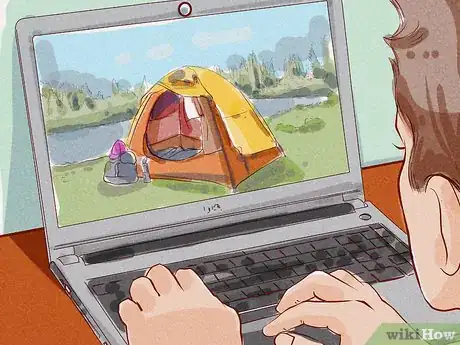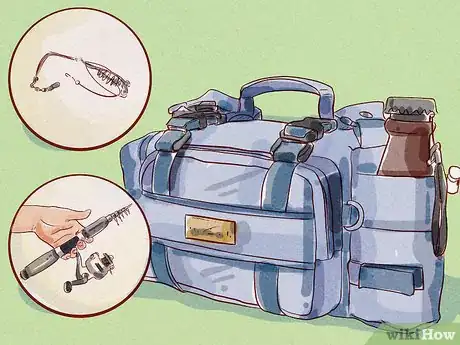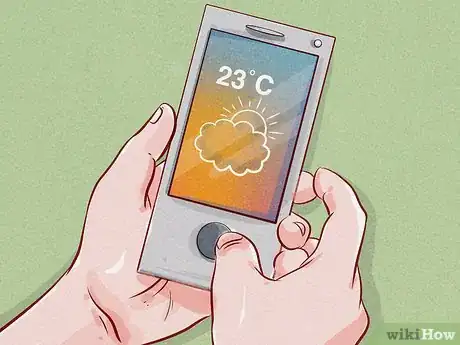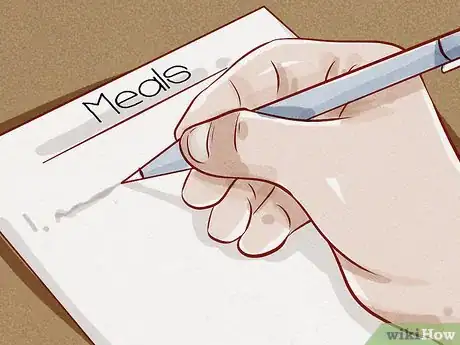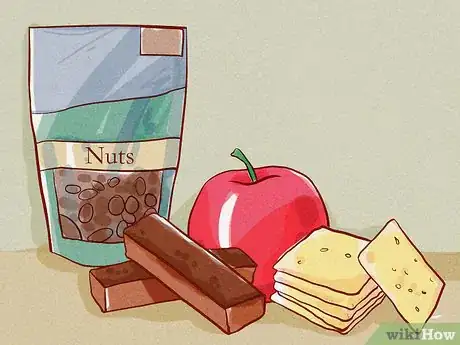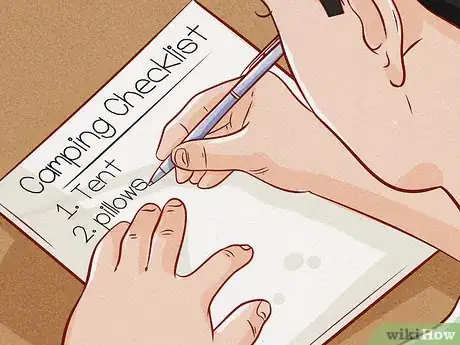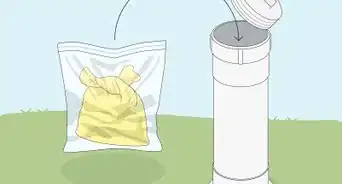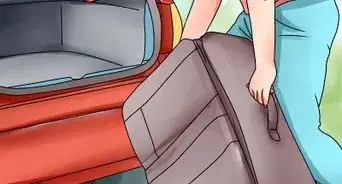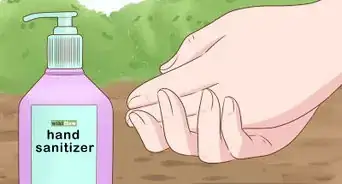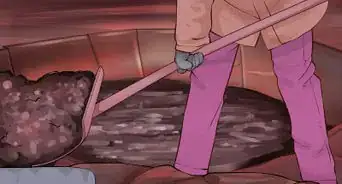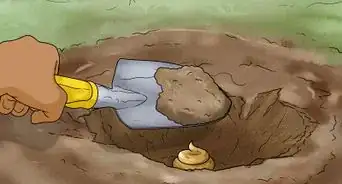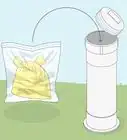This article was co-authored by Sarah McDonald. Sarah McDonald is a Certified Stylist and Image Consultant and the Owner of Pivotal Style. She helps both men and women feel confident through clothing by guiding them on how to dress based on body type, color tone, lifestyle, and personal and professional goals. Sarah received her Image and Style Professional Certification from The Fashion Stylist Institute.
There are 9 references cited in this article, which can be found at the bottom of the page.
This article has been viewed 32,457 times.
Get ready for a fun weekend outdoors by preparing for your camping trip strategically. Pick out a campsite for your needs, and try to reserve your spot ahead of time. When packing, plan out things like which meals you'll eat and which outfits to bring that are versatile. Create a checklist to make sure you don't forget anything super important, such as your camping gear and a first-aid kit.
Steps
Choosing the Right Campsite
-
1Choose the ideal campsite for your needs. If you want to completely submerge yourself in nature and be entirely secluded, there are camping spots you can select that will give you this experience. However, if you want to camp but also want access to bathrooms, running water, and electrical outlets, you might search for a campground that advertises these amenities.
- Go online to find out campsite options in places such as your nearest national park.
- Websites of campgrounds should list all of the amenities they have, if any.
-
2Pick a campsite that has fun activities nearby. Think about which activities you want to do on your trip, such as hiking, fishing, kayaking, or swimming. This will help you narrow down your campsite options, choosing a site that has at least 1 or 2 of your desired activities.[1]
- Make sure you pack the gear for any activities you wish to do, if necessary.
- Check to see if your campsite rents out kayaks, canoes, or fishing gear for campers to use.
Advertisement -
3Reserve your camping spot beforehand. This is especially important if you've chosen a campground that's more crowded. Either go online to reserve your spot for a selected date, or call the campground to speak to an employee about your visit.
- Be aware that many campgrounds have a camping fee that ranges from $5-10, to a little under $50.
- Some national parks require permits to camp there, so check with the national park to see what you need to do, if necessary.[2]
-
4Check the forecast to prepare for any rain or inclement weather. Ideally, you'll be camping in sunny or cloudy weather, but it's a good idea to look at the forecast for the weekend before you go. If you know there will be inclement weather, think about which camping location you choose—a campsite on low ground won't keep you as dry as a campsite on higher ground with lots of trees to protect you from the rain.[3] [4]
- If there's a chance of rain, make sure you have clothing that will keep you protected, as well as any tent gear needed for the rain.
Planning Your Meals
-
1Decide which meals you'll eat while camping. When choosing meals, you want foods that will travel well and will take minimal effort to cook. Think simple meals like sandwiches, easy breakfast foods, or foil meals you can heat over a campfire. Write down what you'll have for each meal to make sure you don't forget any ingredients.
- Other meal ideas include pancakes, oatmeal, pasta, tacos, and nachos.
- Don't forget to bring s'mores to roast around the campfire!
- Pack bread and peanut butter to make easy peanut butter sandwiches.
-
2Choose simple snacks that can be eaten on the go. If you're on a hike or out swimming, you won't be able to fix a complete meal. Pack snacks like trail mix, fruit, crackers, or granola bars to eat while you're having fun, or to tide you over until the next meal.[5] [6]
- Bring snacks in your backpack if you go on a hike or away from the campsite.[7]
-
3Pack a large cooler strategically to keep everything cold. All of your cold items will need to fit in your cooler, so it's important to pack it well. Place lots of cooler packs on the bottom, stacking things that won't break, such as drinks, on top of the cooler packs. Load up the cooler with the most fragile items (like eggs or bread) on the top.[8]
- Keep anything that can melt, such as chocolate for your s'mores, in the cooler too.
-
4Bring your own water to ensure you don't run out. Even if your campsite has promised to have drinkable water, it's best to bring your own. Bring bottled water you can take with you on hikes or other activities, making sure there's enough water for each person.[9]
- If there's room in your cooler, place your water in there to keep it cold.
Packing Essential Items
-
1Use a camping checklist to ensure you don't forget anything. You can find lots of great camping checklists online, telling you everything you should bring to ensure a successful trip. Put things on your list such as a tent, extra tarp, sleeping bags, pillows, blankets, chairs, and flashlights.[10]
- Other items you'll need are extra batteries, sunscreen, insect repellant, and your toiletries.
- Pack toilet paper and hand sanitizer in case there isn't any on the campgrounds.
-
2Pack any medical supplies that might be needed. A first-aid kit is an important addition to any camping trip, just in case an accident happens. Bring along any allergy medication, needed prescriptions, or pain medicine such as Advil or Tylenol to be prepared.[11]
- Make sure your first-aid kit includes things like bandaids, gauze, antiseptic, and an ice pack.
-
3Plan your wardrobe so you're dressing in layers. Since you'll be in the outdoors during the day and nighttime, you'll likely experience a range of temperatures. Pack clothing you can take on and off, such as jackets, loose pants, hats, or gloves. Pack shoes that are easy to walk in, such as hiking boots, that will protect your feet.[12] [13]
- Bring a bathing suit if the weather will be warm, or winter coats and scarves if the weather is going to be cold.
- Bring a rain jacket if it's going to rain, as well as extra pairs of socks.
-
4Bring kitchen tools if you plan on cooking your meals. This includes things like a skillet or pan, cups, utensils, spatula, a lighter, and foil. Think carefully about what you'll need to create each meal you've planned, and bring the necessary kitchen items.[14]
- Bring a sponge to rinse off any dishes so you're not bringing them back dirty, or opt for disposable utensils and dishes.
- Other important items include paper towels, paring knives, storage bags, and roasting sticks for hot dogs or marshmallows.
Expert Q&A
Did you know you can get expert answers for this article?
Unlock expert answers by supporting wikiHow
-
QuestionWhat should you not forget when camping?
 Britt EdelenBritt Edelen comes to wikiHow after graduating in 2019 from Brown University, where he studied English and German literature and philosophy. While at Brown he contributed frequently to campus publications and worked in the university’s Writing Center. More recently, he has had several articles published in various journals devoted to literary criticism. During his time at wikiHow, Britt supervised and collaborated with writers and editors to continue producing high-quality content and promote wikiHow’s mission of enabling everyone to learn anything.
Britt EdelenBritt Edelen comes to wikiHow after graduating in 2019 from Brown University, where he studied English and German literature and philosophy. While at Brown he contributed frequently to campus publications and worked in the university’s Writing Center. More recently, he has had several articles published in various journals devoted to literary criticism. During his time at wikiHow, Britt supervised and collaborated with writers and editors to continue producing high-quality content and promote wikiHow’s mission of enabling everyone to learn anything.
BA in English Literature, Brown University You'll need food and water, so make sure you're packing enough for each person. You'll also need a flashlight, some decent shoes, a backpack, and your tent. It really depends on how long you're going to be camping, but as a rule of thumb, make sure you bring a little bit more than you think you'll need just to be safe.
You'll need food and water, so make sure you're packing enough for each person. You'll also need a flashlight, some decent shoes, a backpack, and your tent. It really depends on how long you're going to be camping, but as a rule of thumb, make sure you bring a little bit more than you think you'll need just to be safe. -
QuestionWhat if it's going to rain?
 Britt EdelenBritt Edelen comes to wikiHow after graduating in 2019 from Brown University, where he studied English and German literature and philosophy. While at Brown he contributed frequently to campus publications and worked in the university’s Writing Center. More recently, he has had several articles published in various journals devoted to literary criticism. During his time at wikiHow, Britt supervised and collaborated with writers and editors to continue producing high-quality content and promote wikiHow’s mission of enabling everyone to learn anything.
Britt EdelenBritt Edelen comes to wikiHow after graduating in 2019 from Brown University, where he studied English and German literature and philosophy. While at Brown he contributed frequently to campus publications and worked in the university’s Writing Center. More recently, he has had several articles published in various journals devoted to literary criticism. During his time at wikiHow, Britt supervised and collaborated with writers and editors to continue producing high-quality content and promote wikiHow’s mission of enabling everyone to learn anything.
BA in English Literature, Brown University If you think it might rain, don't bring anything you want to keep clean! Don't put anything water-sensitive in your backpack, even if your backpack claims to be waterproof. Just put a trash bag on the inside and then put your items inside of that to give you an extra layer of lining. Ziploc bags are going to be your best friend if it rains. Anything that needs to stay dry can go inside a Ziploc bag and you can rest easy at night knowing it'll be dry when you wake up.
If you think it might rain, don't bring anything you want to keep clean! Don't put anything water-sensitive in your backpack, even if your backpack claims to be waterproof. Just put a trash bag on the inside and then put your items inside of that to give you an extra layer of lining. Ziploc bags are going to be your best friend if it rains. Anything that needs to stay dry can go inside a Ziploc bag and you can rest easy at night knowing it'll be dry when you wake up. -
QuestionWhat should I look for in a pair of hiking boots?
 Britt EdelenBritt Edelen comes to wikiHow after graduating in 2019 from Brown University, where he studied English and German literature and philosophy. While at Brown he contributed frequently to campus publications and worked in the university’s Writing Center. More recently, he has had several articles published in various journals devoted to literary criticism. During his time at wikiHow, Britt supervised and collaborated with writers and editors to continue producing high-quality content and promote wikiHow’s mission of enabling everyone to learn anything.
Britt EdelenBritt Edelen comes to wikiHow after graduating in 2019 from Brown University, where he studied English and German literature and philosophy. While at Brown he contributed frequently to campus publications and worked in the university’s Writing Center. More recently, he has had several articles published in various journals devoted to literary criticism. During his time at wikiHow, Britt supervised and collaborated with writers and editors to continue producing high-quality content and promote wikiHow’s mission of enabling everyone to learn anything.
BA in English Literature, Brown University How they fit and how comfortable they are are the most important things. If you're going to be wearing these boots for hours at a time, you don't want to end up in pain after your first day on the trails. Remember, if you're wearing hiking socks, you probably want to move up half a size just to make sure you have enough room for you toes. You don't need a crazy expensive pair or anything like that, but don't buy the cheapest thing you can find. Decent hiking boots are a really important investment if you're camping regularly.
How they fit and how comfortable they are are the most important things. If you're going to be wearing these boots for hours at a time, you don't want to end up in pain after your first day on the trails. Remember, if you're wearing hiking socks, you probably want to move up half a size just to make sure you have enough room for you toes. You don't need a crazy expensive pair or anything like that, but don't buy the cheapest thing you can find. Decent hiking boots are a really important investment if you're camping regularly.
References
- ↑ https://www.campingintheforest.co.uk/blog/camping-information/camping-for-beginners
- ↑ https://drifttravel.com/7-tips-to-prepare-for-your-next-camping-trip/
- ↑ https://www.campingintheforest.co.uk/blog/camping-information/camping-for-beginners
- ↑ Britt Edelen. Outdoor Educator. Expert Interview. 7 February 2020.
- ↑ https://camillestyles.com/wellness/travel/how-to-have-the-perfect-camping-weekend/
- ↑ https://www.cookinglight.com/entertaining/holidays-occasions/what-to-pack-cook-weekend-camping-trip-menu-guide
- ↑ Britt Edelen. Outdoor Educator. Expert Interview. 7 February 2020.
- ↑ https://www.cookinglight.com/entertaining/holidays-occasions/what-to-pack-cook-weekend-camping-trip-menu-guide
- ↑ Britt Edelen. Outdoor Educator. Expert Interview. 7 February 2020.
- ↑ https://www.cozi.com/blog/family-camping-checklist-and-a-few-great-tips/
- ↑ https://www.acacamps.org/sites/default/files/resource_library/operations-guide/ehe-suggested-camp-supplies.pdf
- ↑ Sarah McDonald. Certified Stylist & Image Consultant. Expert Interview. 26 August 2021.
- ↑ https://gizmodo.com/so-you-want-to-go-camping-for-the-very-first-time-1582236909
- ↑ https://www.cozi.com/blog/family-camping-checklist-and-a-few-great-tips/
